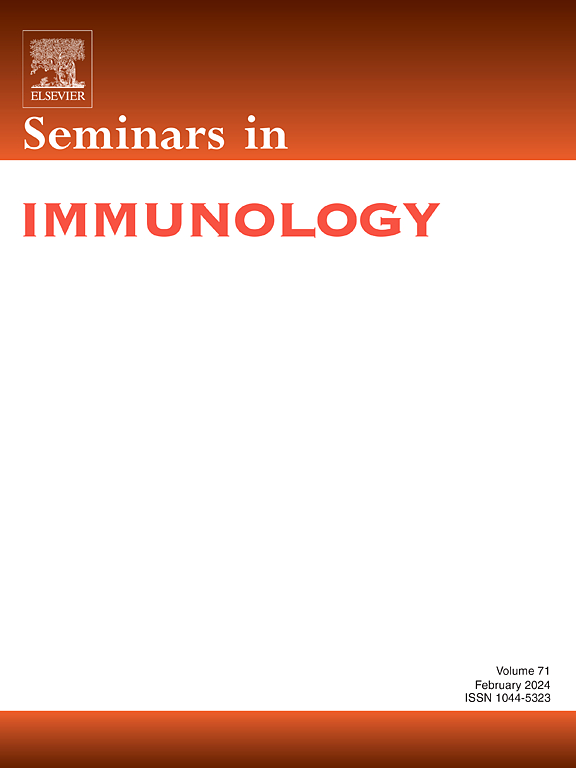Acetylation and deacetylation dynamics in stress response to cancer and infections
IF 7.4
2区 医学
Q1 IMMUNOLOGY
引用次数: 0
Abstract
In response to stress stimuli, cells have evolved various mechanisms to integrate internal and external signals to achieve dynamic homeostasis. Lysine acetyltransferase (KATs) and deacetyltransferase (KDACs) are the key modulators of epigenetic modifications, enabling cells to modulate cellular responses through the acetylation and deacetylation of both histone and nonhistone proteins. Understanding the signaling pathways involved in cellular stress response, along with the roles of KATs and KDACs may pave the way for the development of novel therapeutic strategies. This review discusses the molecular mechanisms of acetylation and deacetylation in stress responses related to tumorigenesis, viral and bacterial infections. In tumorigenesis section, we focused on the tumor cells’ intrinsic and external molecules and signaling pathways regulated by acetylation and deacetylation modification. In viral and bacterial infections, we summarized the update research on acetylation and deacetylation modification in viral and bacterial infections, which systematical introduction on this topic is not too much. Additionally, we provide an overview of current therapeutic interventions and clinical trials involving KAT and KDAC inhibitors in the treatment of cancer, as well as viral and bacterial infection-related diseases.
对癌症和感染的应激反应中的乙酰化和去乙酰化动力学
为了应对应激刺激,细胞进化出多种机制来整合内外信号以实现动态稳态。赖氨酸乙酰转移酶(KATs)和去乙酰转移酶(kdac)是表观遗传修饰的关键调节剂,使细胞能够通过组蛋白和非组蛋白的乙酰化和去乙酰化来调节细胞反应。了解参与细胞应激反应的信号通路,以及KATs和kdac的作用,可能为开发新的治疗策略铺平道路。本文综述了乙酰化和去乙酰化在肿瘤发生、病毒和细菌感染等应激反应中的分子机制。在肿瘤发生部分,我们重点研究了肿瘤细胞内、外分子及乙酰化和去乙酰化修饰调控的信号通路。在病毒和细菌感染方面,我们对病毒和细菌感染中乙酰化和去乙酰化修饰的最新研究进行了综述,对这一主题的系统介绍不多。此外,我们还概述了目前涉及KAT和KDAC抑制剂治疗癌症以及病毒和细菌感染相关疾病的治疗干预措施和临床试验。
本文章由计算机程序翻译,如有差异,请以英文原文为准。
求助全文
约1分钟内获得全文
求助全文
来源期刊

Seminars in Immunology
医学-免疫学
CiteScore
11.40
自引率
1.30%
发文量
50
审稿时长
89 days
期刊介绍:
Seminars in Immunology is a specialized review journal that serves as a valuable resource for scientists in the field of immunology. The journal's approach is thematic, with each issue dedicated to a specific topic of significant interest to immunologists. It covers a wide range of research areas, from the molecular and cellular foundations of the immune response to the potential for its manipulation, highlighting recent advancements in these areas.
Each thematic issue is curated by a guest editor, who is recognized as an expert in the field internationally. The content of each issue typically includes six to eight authoritative invited reviews, which delve into various aspects of the chosen topic. The goal of these reviews is to provide a comprehensive, coherent, and engaging overview of the subject matter, ensuring that the information is presented in a timely manner to maintain its relevance.
The journal's commitment to quality and timeliness is further supported by its inclusion in the Scopus database, which is a leading abstract and citation database of peer-reviewed literature. Being indexed in Scopus helps to ensure that the journal's content is accessible to a broad audience of researchers and professionals in immunology and related fields.
 求助内容:
求助内容: 应助结果提醒方式:
应助结果提醒方式:


